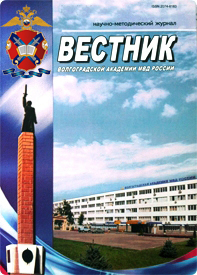It should be stated that so far failed to change the situation in the sphere of security and protection of individual rights, which is largely due to the inefficiencies of the enforcement authority, their bureaucracy, corruption and other negative features. Among the conditions conducive to overcoming the marked and some other negative trends in the functioning of the Russian state and the law should be called understanding and appreciation of some aspects of the human rights system, its elements and forms of realization of being in its infancy. Relevance of this line of research is discussed everywhere and causes a lot of scientific debate. Analyzing the special and scientific literature, one can conclude that the human rights system is a complex, all-encompassing concept. It includes civil society institutions, special authorities, the President, the Government, the institution of the Commissioner for Human Rights, but in addition to static entities is in constant changing and evolving dynamics based on the law enforcement and judicial practice, focusing on the level of modern legal education and legal culture thereby forming a human rights policy in Russia. The need to determine the location of the legal system in the application of the human rights system today is dictated not only the interests of strengthening the legal status of the individual, but also the objective needs of Russian society and the state in protecting the constitutional system, morality, and other constitutionally recognized values.
protection of rights and freedoms, human rights policy, civil society, the institutions of government, law enforcement policy, rule of law, human rights system
1. Mihalenko Yu. P. Politicheskiy ideal Platona v kontekste real'noy istorii. M., 2003.
2. Skirbekk G., Gil'e N. Istoriya filosofii. M., 2003.
3. Istoriya politicheskih i pravovyh ucheniy: uchebnik / pod red. O. E. Leysta. M., 1997.
4. Bol'shaya sovetskaya enciklopediya. M., 1969-1978.
5. Irhin Yu. V. Vzaimosvyaz' politiki morali i prava // Vestnik Rossiyskogo universiteta druzhby narodov. 1999. № 1. S. 10.
6. Harold Temperley and Lillian M. Penson. Foundation of British Foreign Policy from Pitt (1792) to Sallsbury (1902). Cambridge, 1938.
7. Ugolovnoe pravo na sovremennom etape. Problemy prestupleniya i nakazaniya / pod red. N. A. Belyaeva, V. K. Glistina, V. V. Orehova. SPb., 1992.
8. Matuzov N. I., Mal'ko A. V. Teoriya gosudarstva i prava: kurs lekciy. M., 2000.
9. Matuzov N. I., Mal'ko A. V., Shundikov K. V. Pravovaya politika sovremennoy Rossii: predlagaem proekt koncepcii dlya obsuzhdeniya // Pravovaya politika i zhizn'. 2004. № 1. S. 28.
10. Gurzhiy T. A. Pravovye akty v sisteme istochnikov gosudarstvennoy politiki // Pravo i politika. 2014. № 1. S. 31-36.
11. Korotkova M. G. Sud kak sub'ekt pravovoy politiki (k postanovke problemy) // Ros. sud'ya. 2006. № 8. S. 11.
12. Isakov N. V. O soderzhanii termina «pravovaya politika» // Novaya pravovaya mysl'. 2003. № 2. S. 12.
13. Matuzov N. I. Ponyatie i osnovnye prioritety rossiyskoy pravovoy politiki // Pravovedenie. 1997. № 4. S. 17.
14. Bykov O. N. Nacional'nye interesy i vneshnyaya politika. M., 2010.
15. Stat'ya 5 Grazhdanskogo kodeksa Rossiyskoy Federacii [Elektronnyy resurs] (s izm. na 22 oktyabrya 2014 g.) (v red. ot 2 marta 2015 g.). Dostup iz sprav.-pravovoy sistemy «Konsul'tantPlyus».
16. Isakov N. V. Pravovaya politika sovremennoy Rossii: problemy teorii i praktiki: avtoref. dis. … d-ra yurid. nauk. Rostov n/D, 2004.
17. Rudkovskiy V. A. Nekotorye osobennosti razvitiya teorii pravovoy politiki v sovetskoy yuridicheskoy literature // Pravo kak cennost' i sredstvo gosudarstvennogo upravleniya obschestvom. Volgograd, 2007.









